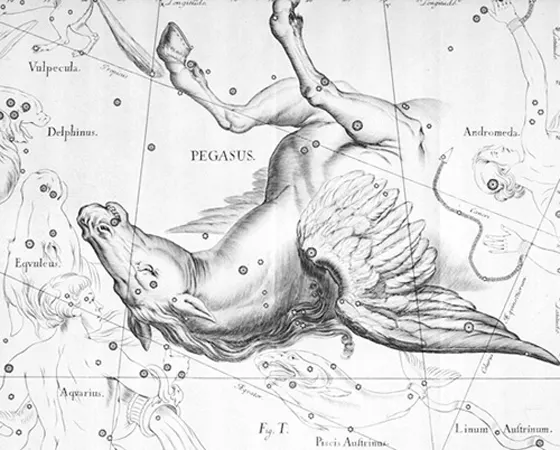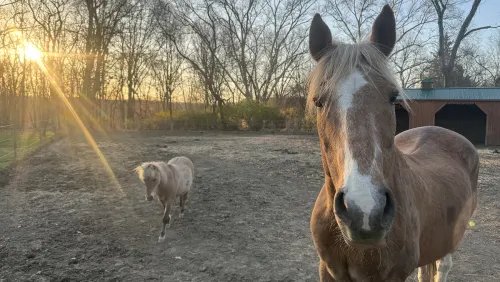I really want to like Sam Worthington, but frankly, I’m just not impressed. While I could spend the next 1000 words telling you why I didn’t like Avatar, that’s probably not what you’re expecting to read on a Chronicle horse history blog!
So what is the point? Sam Worthington plays the hero Perseus in Clash of the Titans. Furthermore, Sam Worthington, who plays the hero Perseus, gets to ride Pegasus in Clash of the Titans.
I’m jealous.
While the movie itself was fairly entertaining, I was a little disappointed that they invested millions of dollars into special effects and fancy monsters but didn’t seem to bother to do their historical research.
They got Pegasus all wrong.
I’ll try to explain without giving away the movie.
For starters, let’s check out the Online Etymology Dictionary again.
Pegasus — winged horse in Greek mythology, late 14th century from Classical Latin from Greek Pegasos, usually said to be from pege “spring, font” (plural pegai), especially in “springs of Ocean,” near which Medusa was said to have been killed by Perseus (Pegasus sprang from her blood). But this may be folk etymology, and the suffix -asos suggests a pre-Greek origin.
Pegasus’ story starts with his mother, Medusa, who was a beautiful young woman. Poseidon, the god of the sea, had a crush on Medusa and seduced her into the temple of Athena. Athena was understandably annoyed and turned Medusa into a Gorgon.
ADVERTISEMENT
Meanwhile, King Polydectes fell in love with a woman named Danae, who had a young son named Perseus. Because Perseus was such a tenacious protector of his mother, Polydectes wanted to get rid of him. He sent him on a quest to bring back Medusa’s head and was pretty confident that Perseus wouldn’t return.
Perseus knew he couldn’t fight Medusa all by his lonesome, so he headed out to find Athena. Athena, being the awesome goddess she was, gave him two gifts: the winged shoes of Hermes and a super shiny shield. Super. Shiny. Shield. Say that three times fast!
Off Perseus went to battle Medusa, and when he used the Super Shiny Shield to deflect her gaze and chopped off her head, he got a bonus prize. Pegasus was born!
Now, the legends vary here. One says he was born of the blood that ran from Medusa’s neck, another says that he was born when her blood mixed with sea foam, and still another says he was created when her blood mixed with the earth. But whichever theory you choose to believe, the fact of the matter is that Pegasus was born when Perseus killed Medusa (which is where the movie screwed up!) Pegasus’ brother, Chrysaor, was born at the same moment.
Legend splits again here. One tale says that Perseus and Pegasus flew off into the sunset together and on their way home heard the cries of a woman. Perseus decided to investigate and found Andromeda chained to a rock as a sacrifice to a sea monster. Perseus flew down, rescued her, married her and then set Pegasus free.
Another story says that after Pegasus was born, he flew away to Mount Helicon, where he landed and created springs with his hooves. These springs became the Hippocrene Spring, and Mount Helicon was known as the gathering place of the nine Muses. The fountain became sacred and known as a source for poetic inspiration, and is perhaps why Pegasus was so well liked by many authors over the centuries.
After Pegasus’ relationship with Perseus ended, he found a new rider in Bellepheron. Bellepheron was an adventure seeker, and at the tender age of 16, he headed out to find something cool to do. While traveling, he ran into Proteus, who pretended to be his friend but really was jealous and wanted to kill Bellepheron. He gave the boy a sealed message and told him to deliver it to the King of Lycia, his father-in-law.
When he arrived in Lycia, everyone was down in the dumps. The Chimera kept carrying off the women, children and livestock of the city. When Bellepheron delivered Proteus’ message to the king, which basically said, “I hate this kid, kill him please, Dad!” the king decided to send Bellepheron to kill the Chimera.
Of course Bellepheron accepted the task, and off he went to chat with Polyidus, who was the smartest dude in all of Lycia. Polyidus told him about Pegasus and sent him to spend the night in Athena’s temple.
ADVERTISEMENT
Athena, being the awesome goddess she was, gave Bellepheron a golden bridle and instructions on where to find Pegasus in a dream.
After making his way through the forest to the well, Bellepheron hid in the bushes (clever, right?) until Pegasus arrived. He jumped out, put the bridle on his head and leaped onto his back. Pegasus was not happy and tried to buck him off, but Bellepheron managed to tame him.
Together, Pegasus and Bellepheron flew to the Chimera’s home, and Bellepheron proceeded to stab it through the heart. When the dynamic duo returned to Lycia, the city rejoiced, and the king gave Bellepheron his daughter as a gift.
As the years went on, Bellepheron became a cocky sonofagun, and he decided that he should be a god as well. He flew up to Olympus on Pegasus, which, understandably, didn’t sit well with Zeus. Zeus sent a gadfly to bite Pegasus, which made him buck Bellepheron off, sending him plummeting to the ground. Bellepheron lived the rest of his life crippled and blind.
Pegasus, however, was honored with a special stable and the esteemed position of “Zeus’ Thunderbolt Carrier Extraordinaire.” Some legends say that he found a mate, Euippe, and had two offspring, Celeris and Melanippe, from which the breed of winged horses originated.
On the final day of Pegasus’ life, Zeus turned him into a constellation. Legend goes that a single feather fell to the earth in the city of Tarus in the very moment he was fixated in the sky.
Some people feel that something can’t exist unless they’ve seen it. It’s impossible to say if the myths and legends surrounding Pegasus are real, or if he, in some form, existed so many years ago. But, I do know that if seeing is believing, than all you have to do is look to the stars.
One of web writer Coree Reuter’s favorite parts of working at The Chronicle of the Horse is adventuring up into the attic. While it’s occasionally a journey that requires a head lamp, GPS unit and dust mask, nearly 75 years of the equine industry is documented in the old issues and photographs that live above the offices, and Coree is determined to unearth the great stories of the past. Inspired by the saying: “History was written on the back of a horse,” she hopes to demystify the legends, find new ones and honor the horses who have changed the scope of everyday life with this blog.















